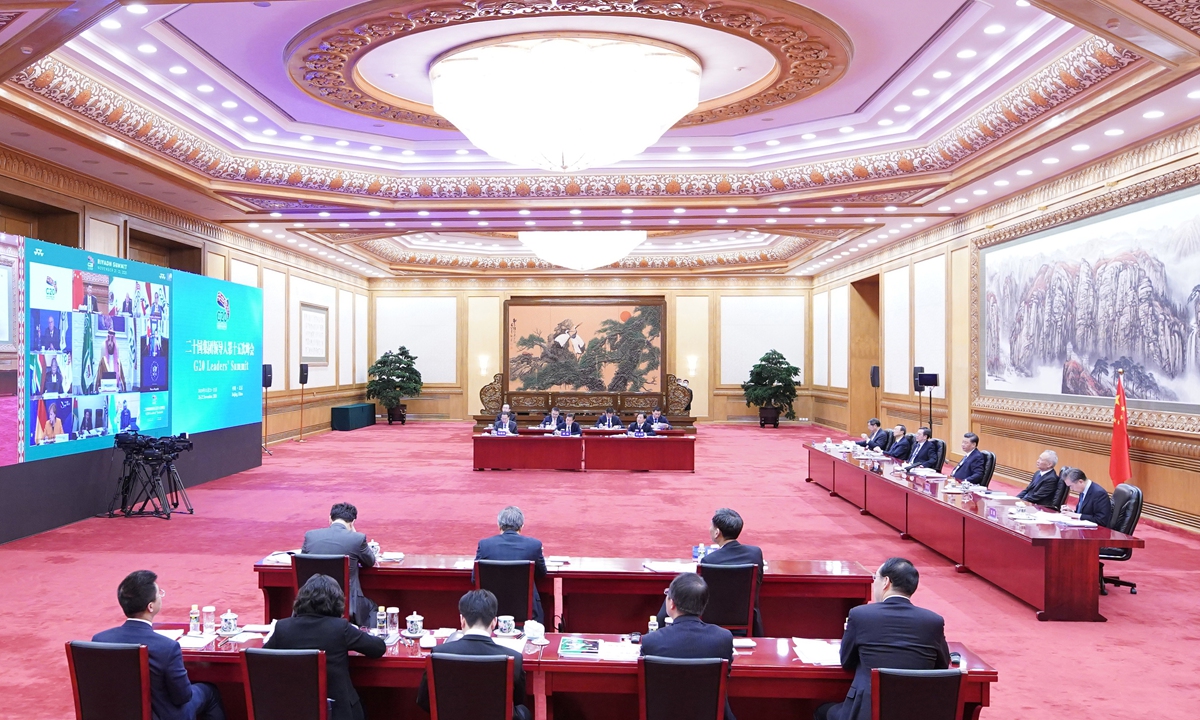Emission reduction in construction, transportation essential for China to achieve carbon neutrality by 2060: expert
Emission reduction in construction, transportation essential to 2060 goal

The Chinese delegation in Beijing participate in the virtual 15th G20 Leaders' Summit on Saturday night. G20 leaders including Chinese President Xi Jinping attended the summit, which was chaired by Saudi Arabia. Photo: Xinhua
China will honor its commitment to achieving carbon neutrality by 2060 and see the implementation through, Chinese President Xi Jinping said on Sunday in his speech given via video link from Beijing at the Leaders' Side Event on Safeguarding the Planet of the G20 Riyadh Summit.
Xi called for efforts to follow the vision of a community with a shared future for mankind, pitch in to tackle climate and other environmental challenges, and protect the blue planet. He also shared his thoughts on what the G20 can do on the issue.
Xi said the G20 should continue to take the lead in tackling climate change and should push for full and effective implementation of the Paris Agreement. He called for efforts to deepen the transition toward clean energy and protect the ecosystem with respect for nature.
China welcomes the participation of all parties and hopes the meeting will set goals and take actions to ensure the protection of global biodiversity in the years ahead, Xi noted.
During a speech delivered at the UN General Assembly in September, Xi announced that China aims to peak carbon dioxide emissions before 2030 and achieve carbon neutrality before 2060, and he vowed to adopt "more vigorous policies and measures." Experts said that Xi's speech indicates China will keep its word.
Corresponding measures on carbon reduction have been underway with new technologies and measures. Some places in China have managed to recycle waste carbon dioxide emissions for new uses after it is purified, for example using it to feed spirulina, a cyanobacteria that can be used as a food supplement.
In addition, increasing R&D and investment in scientific and technological products will play an important role in the process of energy conservation and emissions reduction, experts said.
Lin Boqiang, director of the China Center for Energy Economics Research at Xiamen University, told the Global Times that China's pledge of carbon neutrality by 2060 comes at a time when US President Donald Trump has delayed taking action against climate change for four years. Now there are new hopes that the US will rejoin the fight against climate change.
Moreover, given the fact that international frictions are more acute, and climate change is a common goal for all countries, China's active participation comes with the good intention of reducing international friction as well, Lin said.
However, as a large emitter, China is still in the middle of the development, so it is the most difficult country to reduce emissions in the world, experts said.
Zhou Hongchun, a research fellow with the Development Research Center of the State Council, China's cabinet, told the Global Times on Sunday that for China to achieve carbon neutrality by 2060, some remaining issues such as the reduction of carbon emissions from buildings and construction as well as transportation still need to be addressed, which is not easy, especially when China's industrialization and urbanization process has not been fulfilled yet.
To be carbon neutral by 2060, most parts of the country, especially the east, would have to peak their emissions by 2050. Innovation demonstration zones in the Yangtze River Delta and Shenzhen in South China's Guangdong Province need to be carbon neutral at least five years ahead of that, Zhou said.
"Although the EU has proposed carbon neutrality by 2050 and China has proposed to achieve it by 2060, our goal is much more difficult than theirs, because fossil fuel energy currently accounts for 85 percent of all energy in our country, which is far more than in any of their countries," Lin said.
In addition, in terms of capacity positioning, China is still a manufacturing country, and as long as it remains so, it will not be able to switch to imported steel and cement due to the impact on costs and the supply chain, Lin said.
At present, China's production capacity is more than half the international level. If China is still dominated by manufacturing, it will be difficult to get rid of the upstream industrial chain, which includes natural resources like steel, cement, aluminum and copper, industry insiders said.
"Would Europe and the US have been as successful in achieving carbon neutrality as they are today if they had not been supported by upstream products from China? The answer is no," Lin said.
Despite the challenges, China will strive to achieve the carbon neutrality by 2060 and the commitment has earned it respect around the world.
"It took us the first 40 years to make the fossil energy system very large, and it will take the next 40 years to make it radically different," said Lin, noting that about 85 percent of the energy consumption in China derives from fossil fuels which will need to be replaced by clean energy.
"Given the fact that clean energy is more costly on price than the fossil fuels, how to balance the unprecedented cost in the transformation while achieving sustainable economic growth and ensuring good livelihoods for the people must be considered," Lin said.
Among the potential challenges, one of the most direct hurdles is the transformation of state-owned energy companies.
"More than 90 percent of China's energy is supplied by state-owned enterprises. They need to transform from traditional to new energy, because the private companies that only occupy a small proportion of the energy field won't be adequate for the task," Lin said.


